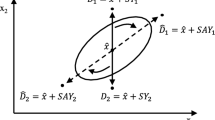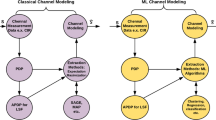Abstract
Channel estimation is employed to get the current knowledge of channel states for an optimum detection in fading environments. In this paper, a new recursive multiple input multiple output (MIMO) channel estimation is proposed which is based on the recursive least square solution. The proposed recursive algorithm utilizes short training sequence on one hand and requires low computational complexity on the other hand. The algorithm is evaluated on a MIMO communication system through simulations. It is realized that the proposed algorithm provides fast convergence as compared to recursive least square (RLS) and robust variable forgetting factor RLS (RVFF-RLS) adaptive algorithms while utilizing lesser computational cost and provides independency on forgetting factor.







Similar content being viewed by others
References
Prasad, R., & Mihovska, A. (2009). New horizons in mobile and wireless communications: Radio interfaces (Vol. 1). Boston: Artech House.
El Gamal, Hesham, & Roger Hammons, A. R. (2003). On the design of algebraic space-time codes for MIMO block-fading channels. IEEE Transactions on Information Theory, 49(1), 151–163.
Amin, M. R., & Trapasiya, S. D. (2012). Space time coding scheme for MIMO system-literature survey. Procedia Engineering, 38, 3509–3517.
Mohammed, S. K., Zaki, A., Chockalingam, A., & Rajan, B. S. (2009). High-rate spacetime coded large-MIMO systems: Low-complexity detection and channel estimation. IEEE Journal of Selected Topics in Signal Processing, 3(6), 958–974.
Balanis, C. A. (2012). Antenna theory: Analysis and design. New York: Wiley.
Dokhanchi, H., & Falahati, A. (2010). Adaptive MIMO LS estimation technique via MSE criterion over a Markov channel model. In IEEE symposium on computers and communications (ISCC) (pp. 151–154), Riccione, Italy.
Kashoob, M., & Zakharov, Y. (2016). Selective detection with adaptive channel estimation for MIMO OFDM. In IEEE signal processing workshop on sensor array and multichannel (SAM) (pp. 1–5), Rio de Janerio, Brazil.
Gui, G., Xu, L., Shan, L., & Adachi, F. (2014). Adaptive MIMO channel estimation using sparse variable step-size NLMS algorithms. In IEEE international conference on communication systems (ICCS) (pp. 605–609), Macau, China.
Liu, X., Wang, J., Li, Z., & Si, J. (2017). Soft-output MMSE MIMO detector under different channel estimation models. IET Communications, 11(2), 192–197.
Tong, L. (1995). Blind sequence estimation. IEEE Transactions on Communications, 43(12), 2986–2994.
Vosoughi, A., & Scaglione, A. (2003). Channel estimation for precoded MIMO systems. In IEEE workshop on statistical signal processing (pp. 442–445), St. Louis, Mo, USA.
Sayed, A. H., & Kailath, T. (1994). A state-space approach to adaptive RLS filtering. IEEE Signal Processing Magazine, 11(3), 18–60.
Zou, Y., Chan, S. C., & Ng, T. S. (2000). A recursive least M-estimate (RLM) adaptive filter for robust filtering in impulse noise. IEEE Signal Processing Letters, 7(11), 324–326.
Bhotto, M. Z. A., & Antoniou, A. (2011). Robust recursive least-squares adaptive-filtering algorithm for impulsive-noise environments. IEEE Signal Processing Letters, 18(3), 185–188.
Haykin, S. S. (2008). Adaptive filter theory. Englewood Cliffs, NJ: Prentice Hall.
Verhaegen, M., & Verdult, V. (2012). Filtering and system identification: A least squares approach. Cambridge: Cambridge University Press.
Kovacevic, B., Banjac, Z., & Milosavljevic, M. (2013). Adaptive digital filters. Berlin: Springer.
Benveniste, A., & Basseville, M. (1984). Detection of abrupt changes in signals and dynamical systems: Some statistical aspects. Analysis and Optimization of Systems, 62, 143–155.
Song, S. (2003). Self-tunning adaptive algorithm and applications. Doctoral dissertation, Ph.D. Dissertation, Seoul National University, 1525. http://library.snu.ac.kr/Eng/DetailView.jsp?uid=11&cid=1112838.
Karami, E., & Shiva, M. (2006). Decision-directed recursive least squares MIMO channels tracking. EURASIP Journal on Wireless Communications and Networking, 2006(2), 7–7.
Arablouei, R., & Doganay, K. (2011). Modified RLS algorithm with enhanced tracking capability for MIMO channel estimation. Electronics Letters, 47(19), 1101–1103.
Akino, T. K. (2008). Optimum-weighted RLS channel estimation for rapid fading MIMO channels. IEEE Transactions on Wireless Communications, 7, 4248–4260.
Yapici, Y., & Yilmaz, A. O. (2009). Low-complexity iterative channel estimation and tracking for time-varying multi-antenna systems. In 2009 IEEE 20th international symposium on personal, indoor and mobile radio communications (pp. 1317–1321), Tokyo, Japan.
Moshavi, S., Kanterakis, E. G., & Schilling, D. L. (1996). Multistage linear receivers for DS-CDMA systems. International Journal of Wireless Information Networks, 3(1), 1–17.
Honig, M. L., & Xiao, W. (2001). Performance of reduced-rank linear interference suppression. IEEE Transactions on Information Theory, 47(5), 1928–1946.
Sessler, G. M., & Jondral, F. K. (2005). Low complexity polynomial expansion multiuser detector for CDMA systems. IEEE Transactions on Vehicular Technology, 54(4), 1379–1391.
Hoydis, J., Debbah, M., & Kobayashi, M. (2011). Asymptotic moments for interference mitigation in correlated fading channels. In 2011 IEEE international symposium on information theory proceedings (ISIT) (pp. 2796–2800), Saint Peterburg, Russia.
Paleologu, C., Benesty, J., & Ciochina, S. (2008). A robust variable forgetting factor recursive least-squares algorithm for system identification. IEEE Signal Processing Letters, 15, 597–600.
Jakes, W. C. (1974). Microwave mobile communications (3rd ed.). New York: Wiley.
Bello, P. (1963). Characterization of randomly time-variant linear channels. IEEE Transactions on Communications Systems, 11(4), 360–393.
Tsatsanis, M. K., Giannakis, G. B., & Zhou, G. (1996). Estimation and equalization of fading channels with random coefficients. In IEEE international conference on acoustics, speech, and signal processing, Atlanta, GA, USA (vol. 2, pp. 1093–1096).
Weikert, O. E. (2007). Blinde Demodulation in MIMO-Ubertragungssystemen, Ph.D. dissertation, Helmut Schmidt University/University of the Federal Armed Forces Hamburg, dissertation.de, ISBN 978-3-86624-273-9.
Liu, Z., Ma, X., & Giannakis, G. B. (2002). Space-time coding and Kalman filtering for time-selective fading channels. IEEE Transactions on Communications, 50(2), 183–186.
Komninakis, C., Fragouli, C., Sayed, A. H., & Wesel, R. D. (2002). Multi-input multi-output fading channel tracking and equalization using Kalman estimation. IEEE Transactions on Signal Processing, 50(5), 1065–1076.
Yano, K., & Yoshida, S. (2005). CDMA non-linear interference canceller with multi-beam reception. In Fifth international conference on information, communications and signal processing (pp. 6–10), Bangkok, Thailand.
Author information
Authors and Affiliations
Corresponding author
Rights and permissions
About this article
Cite this article
Raza, H., Khan, N.M. Low Complexity Linear Channel Estimation for MIMO Communication Systems. Wireless Pers Commun 97, 5031–5044 (2017). https://doi.org/10.1007/s11277-017-4763-5
Published:
Issue Date:
DOI: https://doi.org/10.1007/s11277-017-4763-5




